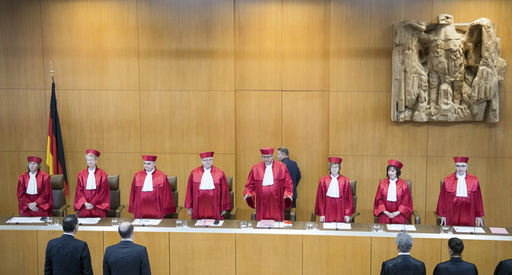Berlin’s legislature has taken a significant step by approving new measures aimed at safeguarding the integrity of the nation’s highest court from potential interference by authoritarian or extremist factions. Drawing lessons from the experiences in Poland, Hungary, and other nations, lawmakers have underscored the necessity of reinforcing the Federal Constitutional Court. This initiative was collaboratively devised by the governing coalition, which recently dissolved, and the main conservative opposition party. The measure received overwhelming support in the Bundestag, passing with a vote of 600 to 69, during what is anticipated to be one of its final sessions before the upcoming early elections in February.
The approved legislation aims to engrain the court’s operational guidelines within the framework of the constitution. This pivotal change stipulates that any amendments to these guidelines will require a two-thirds majority in parliament, as opposed to the simpler majority previously necessary. Interior Minister Nancy Faeser pointed out the correlation between the rise of autocratic leadership and the subsequent undermining of judicial independence, referencing the patterns observed in various nations, although she did not specify any particular countries during her address.
Particularly, advocates of this legislation have highlighted the situation in Poland, where the prior nationalist conservative leadership sought to exert influence over the Constitutional Tribunal. The Federal Constitutional Court, headquartered in Karlsruhe, plays a crucial role as the final authority on numerous policy matters within Germany. The court is composed of two panels, each comprising eight judges who serve a single term of 12 years. The newly fortified measures will also codify the age limit of 68 for justices within the constitution, alongside various other stipulations.
However, the far-right Alternative for Germany party has criticized these reforms, alleging that established parties are merely attempting to consolidate their dominance over the court. The selection process for justices is designed to promote balance, with half appointed by the Bundestag and the other half by the Bundesrat, the upper house of parliament, which reflects the interests of Germany’s 16 state governments. Candidates are proposed by political factions and must secure a two-thirds majority to be appointed, thereby minimizing the potential for highly contentious figures to ascend to the judiciary.
Additionally, this reform includes a provision to address situations where minority factions might obstruct the election of judges. This mechanism allows the Bundestag to proceed with the appointment of judges if the Bundesrat proves uncooperative, and vice versa, ensuring that the judiciary remains functional despite possible legislative impasses.


